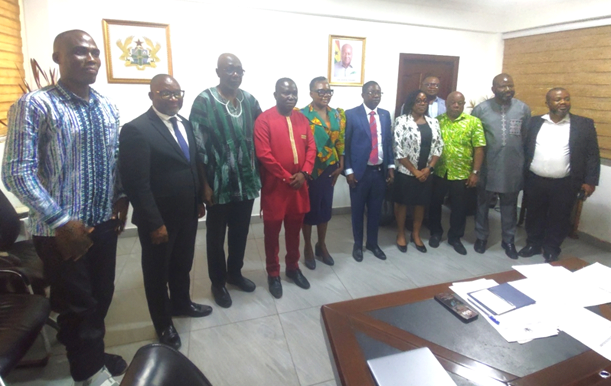…as coastal livelihoods decline
By Kizito CUDJOE
The Fisheries Commission’s newly inaugurated board is promising urgent action to reverse the decline and bring order to the troubled sector.
Chaired by Prof. Wisdom Akpalu of the Ghana Institute of Management and Public Administration (GIMPA), the 10-member board was sworn-in this week with a four-year mandate.
Speaking after the inauguration ceremony, Prof. Akpalu acknowledged the mounting pressure on the country’s marine resources and vowed to confront longstanding challenges including overfishing and widespread illegal, unreported and unregulated (IUU) activities.
“The catch levels have been going down and we have significant IUU activities within the sector – from small-scale to industrial fleets,” he said.
“We also have IUU among the large-scale fisheries, the trawlers, which we have to tackle decisively,” Prof. Akpalu added.
For many fishing families, these problems are not abstract. In fishing towns like Shama in the Western Region and Jamestown in Greater Accra Region where livelihoods depend on the sea, shrinking catches have deepened hardship.
Some fishers blame foreign trawlers for flouting regulations with impunity, while others point to lax enforcement and pollution that have degraded water quality and reduced opportunities for aquaculture.
Prof. Akpalu noted that pollution in water-bodies has become a major concern, further limiting the sector’s potential. He warned that pollution is affecting aquaculture development and compromising the health of our marine ecosystems.
Despite its struggles, the fisheries sector remains a critical part of Ghana’s economy, providing food security, employment and foreign exchange.
In response, the newly inaugurated Fisheries Board said it is ready to support the ministry in reforming the sector. The board has a four-year mandate to realise its objective of ensuring an improved sector, which includes aquaculture.
Beyond marine fishing, aquaculture faces its own hurdles. Prof. Akpalu, for instance, cited high feed costs, accounting for up to 70 percent of production as a major constraint, alongside pollution and limited access to markets or infrastructure for small-scale growers.
“We have human rights issues when it comes to industrial fishing, which also need to be taken a look at. So, our goal will be to look at all these issues,” he assured.
The Minister for Fisheries and Aquaculture, Mrs Emelia Arthur, during its inauguration urged the Board to be guided by the new vision statement adopted by the ministry and its agencies.
“The vision is sustainable, well-governed, resilient fisheries and aquaculture sector driven by equity, innovation and strategic investments, delivering food security, decent jobs, economic growth, resources and environmental stewardship and contributing to the National Blue Economy Agenda.”
She said, “This vision demands more than routine governance. It requires bold decisions, data-driven planning and a deep responsibility to the environment and people”.
Additionally, she charged the Board to submit quarterly reports that show progress, challenges and proposed actions. Adding that “Accountability will be the backbone of our collaboration”.
The Board comprises representatives from academia, the military, industry associations and key ministries including Defence, Transport and Environment.
They include Prof. Benjamin Betey Campion, Executive Director-Fisheries Commission; Commodore Bright E.K. Atiayao-Ministry of Defence; Mr. Prosper Kwame Amewode-Ministry of Transport; and Mr. Cephas Adjei Mensah-Ministry of Environment, Science & Technology.
It also includes Dr. Ruby Asmah, Water Research Institute; Ing. Eric Damuel Adu-Dankwa, Ghana Irrigation Development Authority; Nana Jojo Solomon, National Fisheries Association of Ghana (NAFAG); Mr. Frank Kwesi Aihoon, Ghana Tuna Association (GTA); and Nana Kweigyah Isaac, Canoe and Gear Owners Association.










